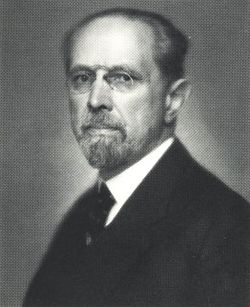by Werner Sombart
(edited & abridged by
henrymakow.com)
The intellectuality of the Jew is so strong that it tends to
develop at the expense of other mental qualities, and the mind is apt to
become one-sided.
The Jew certainly sees remarkably clearly, but he does not see much.
He does not think of his environment as
something alive, and that is why he has lost the true conception of
life, of its oneness, of its being an organism, a natural growth. In
short, he has lost the true conception of the personal side of life.
General experience must surely support this view; but if other proofs
are demanded they will be found in the pecuiarities of Jewish law, which
abolished personal relationships and replaced them by impersonal,
abstract connections or activities or aims.
Hence the [Jewish] lack of sympathy for every status where the nexus is
a personal one. The Jews' whole being is opposed to all that is usually
understood by chivalry, to all sentimentality, knight-errantry,
feudalism, patriarchalism. Nor does he comprehend a social order based
on relationships such as these. "Estates of the realm" and craft
organizations are a loathing to him.
The conception of the universe in the mind of such an intellectual
people must perforce have been that of a structure well-ordered in
accordance with reason. By the aid of reason, therefore, they sought to
understand the world; they were rationalists, both in theory and in
practice.
Now as soon as a strong consciousness of the ego attaches itself to the
predominating intellectuality in the thinking being, he will tend to
group the world round that ego. In other words, he will look at the
world from the point of view of end, or goal, or purpose.
Take any expression of the Jewish genius
and you will be certain to find in it this teleological tendency, which
has sometimes been called extreme subjectivity. Whether or no the
Indo-Germanic races are objective and the Semitic subjective,certain it
is that the Jews are the most subjective of peoples. The Jew never loses
himself in the outer world, never sinks in the depth of the cosmos,
never soars in the endless realms of thought, but, as Jellinek well puts
it, dives below the surface to seek for pearls.
He brings everything into relation with his ego. He is for ever asking
why, what for, what will it bring? Cui bono? His greatest interest is
always in the result of a thing, not in the thing itself. It is
un-Jewish to regard any activity, be it what you will, as an end in
itself; un-Jewish to live your life without having any purpose, to leave
all to chance; un-Jewish to get harmless pleasure out of Nature.
The Jew has taken all that is in Nature
and made of it "the loose pages of a text-book of ethics which shall
advance the higher moral life." The Jewish religion, as we have already
seen, is teleological in its aim; in each of its regulations it as the
ethical norm in view. The entire universe, in the Jew's eyes, is
something that was made in accordance with a plan.
No term is more familiar to the ear of
the Jew than Tachlis, which means purpose, aim, end or goal. If
you are to do anything it must have a tachlis; life itself,
whether as a whole or in its single activities, must have some
tachlis, and so must the universe. Those who assert that the meaning
of Life, of the World, is not tachlis but tragedy, the Jew will
reckon as foolish visionaries.
How deeply the teleological view of things is embedded in the nature of
the Jew may be seen in the case of those of them who, like
the Chassidim, pay no attention to the needs of practical life because
"there is no purpose in them." There is no purpose in making a living,
and so they let their wives and children starve, and devote themselves
to the study of their sacred books.
When this attitude of mind that seeks for a purpose in all things is
united with a strong will, with a large fund of energy (as is generally
the case with the Jew), it ceases to be merely a point of view; it
becomes a policy. The man sets himself a goal and makes for it, allowing
nothing whatever to turn him aside from his course; he is determined, if
you like, stiff-necked. Heine in characterizing his people called it
stubbornness, and Goethe said that the essence of the Jewish character
was energy and the pursuit of direct ends.
--
